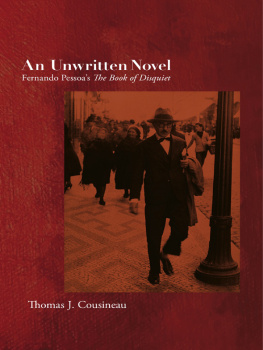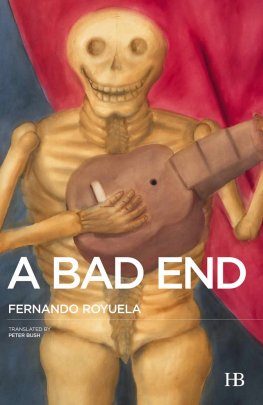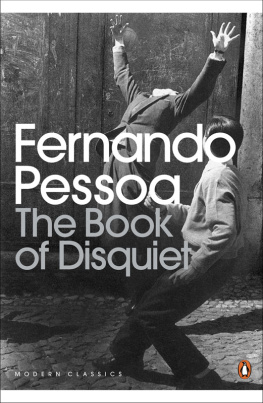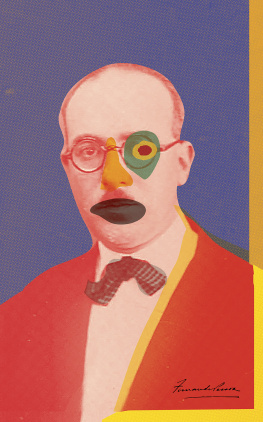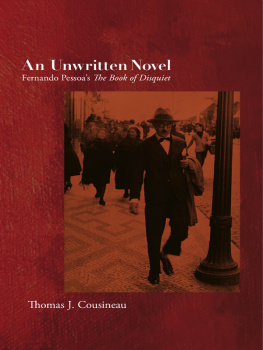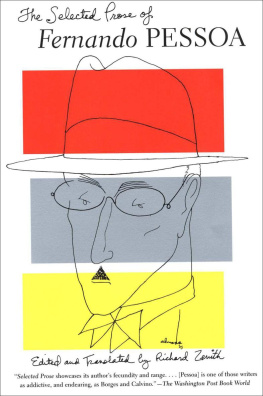Cousineau - An Unwritten Novel: Fernando Pessoas The Book of Disquiet
Here you can read online Cousineau - An Unwritten Novel: Fernando Pessoas The Book of Disquiet full text of the book (entire story) in english for free. Download pdf and epub, get meaning, cover and reviews about this ebook. City: Champaign, year: 2013, publisher: Dalkey Archive Press;Columbia University Press, genre: Science. Description of the work, (preface) as well as reviews are available. Best literature library LitArk.com created for fans of good reading and offers a wide selection of genres:
Romance novel
Science fiction
Adventure
Detective
Science
History
Home and family
Prose
Art
Politics
Computer
Non-fiction
Religion
Business
Children
Humor
Choose a favorite category and find really read worthwhile books. Enjoy immersion in the world of imagination, feel the emotions of the characters or learn something new for yourself, make an fascinating discovery.
An Unwritten Novel: Fernando Pessoas The Book of Disquiet: summary, description and annotation
We offer to read an annotation, description, summary or preface (depends on what the author of the book "An Unwritten Novel: Fernando Pessoas The Book of Disquiet" wrote himself). If you haven't found the necessary information about the book — write in the comments, we will try to find it.
Cousineau: author's other books
Who wrote An Unwritten Novel: Fernando Pessoas The Book of Disquiet? Find out the surname, the name of the author of the book and a list of all author's works by series.
An Unwritten Novel: Fernando Pessoas The Book of Disquiet — read online for free the complete book (whole text) full work
Below is the text of the book, divided by pages. System saving the place of the last page read, allows you to conveniently read the book "An Unwritten Novel: Fernando Pessoas The Book of Disquiet" online for free, without having to search again every time where you left off. Put a bookmark, and you can go to the page where you finished reading at any time.
Font size:
Interval:
Bookmark:

OTHER WORKS BY
THOMAS J. COUSINEAU
Waiting for Godot: Form in Movement
Beckett in France
After the Final No: Samuel Becketts Trilogy
Ritual Unbound: Reading Sacrifice in Modernist Fiction
Three-Part Inventions: The Novels of Thomas Bernhard
An Unwritten Novel
Fernando Pessoa's
The Book of Disquiet
by
THOMAS J. COUSINEAU

Copyright 2013 by Thomas J. Cousineau
First edition, 2013
All rights reserved
A catalog record for this book is available from the Library of Congress.
ISBN 978-1-564-78885-6
ISBN 978-1-564-78983-9 (e-book)
Partially funded by grants from the Illinois Arts Council, a state agency, and the Christian A. Johnson Endeavor Foundation.

www.dalkeyarchive.com
Cover: design and composition by Diane Landskroener, photo by Jos Fabio
Printed on permanent/durable acid-free paper
For Charlotte, Sophie, Sebastien, and Madeleine
An Unwritten Novel offers the general reader, as well as students and teachers of modernism, an Ariadnes thread that will help them to find their way through Fernando Pessoas labyrinthine masterpiece, The Book of Disquiet . The thread itself is woven from the double-stranded observation made by Bernardo Soares (its putative author) that Anything and everything, depending on how one sees it, is a marvel or a hindrance, an all or a nothing, a path or a problem.
The marvel-hindrance that pervades The Book from beginning to end (despite its having neither a beginning nor an end but, rather, an endlessly recurring middle) is the loss of a stable and reassuring vision of the world and of ones place within it. Soaress discovery that he is actually an exile where he had thought himself to be a citizen produces throughout The Book expressions of hopeless nostalgia as well as daydreams of a paradise regained. Once upon a time echoes repeatedly as its signature refrain, but the disquiet to which it gives expression remains as obdurate as ever.
One possible solution to this predicament is to attempt to fill the void left by the collapse of inherited beliefs with a substitute faith. This leads Soaress contemporaries, who are incapable of worshipping the God of their ancestors, to erect a compensatory, yet bogus, cult of humanity and Soares himself to attempt, albeit with equally unconvincing results, to erect a cult of the superior man, which he readily joins. The other solution is to treat this misfortune as an opportunity to devise a new mode of writing that is not tainted with nostalgia. At first glance, Soares appears ill-suited to such an undertaking. A mere assistant bookkeeper in a commercial enterprise, he seems to lack the most rudimentary literary gifts. By his own admission, he cant write poetry and, on the evidence of his factless autobiography, he can neither create believable characters nor write convincing dialogue and narration. As though that werent enough, his aesthetic ideal which he cant possibly duplicate is found in such monumental achievements as Virgils Aeneid and Dantes Divine Comedy .
Fortunately, however, the various hindrances by which Soares is beset go hand-in-hand with the marvel that is The Book itself. Like the aged man in William Butler Yeatss Sailing to Byzantium, The Book is a paltry thing whose soul nonetheless manages to clap its hands and sing, and louder sing/For every tatter in its mortal dress. However, rather than finding consolation, as Yeats does, in the vision of himself as a golden bird, Soares, a self-described building in ruins, produces an incongruous masterpiece in which the diminishment that he experiences as a personal crisis coexists with an artistic achievement in the form of what he calls greater completeness.
Ordinarily, a novelist achieves the effect of completeness by assembling the various parts of his novel so that they contribute to an organized whole. Details of place, for example, are gathered in a way that creates a setting; episodes are arranged in a logical sequence to form a plot; the protagonist is part of a larger human community; dialogue and narration each makes its distinct contribution to the novel as a whole; and the roles of the protagonist, who experiences events, and the author, who produces the work in which they are represented, are clearly distinguished as well. In The Book , however, all five of these narrative elements are unwritten. Lisbon is scarcely present as its setting and the three details that are mentionedoffice, rented-room, and neighboring streetsare only minimally described. Plot dissolves into a series of events that do not cohere into a sustained action. Soares lives in nearly complete isolation from his fellow Lisboetas; both narration and dialogue virtually disappear, as does the distinction between the author and the protagonist.
Each of these mutilations of a properly written novel, however, prepares the way for a compensatory form of greater completeness. On the level of setting, the office, the room, and the neighboring streets become gateways to the infinite. The episodic events that never cohere into a unified plot achieve the intensity of modest apocalypses which acquire an aura of timelessness. Soares, an undistinguished bookkeeper who records his companys accounts in a ledger, metamorphoses into a writer through whom the works of his great predecessorsincluding Dante, Shakespeare, and Miltonare uncannily revived, albeit in the incongruous form of an unwritten novel. The eclipse of narration and dialogue leads to the emergence of a form of writingwhat Soares calls the written voicethat hovers uncannily between speaking and silence. Finally, the blurring of the distinction between the author and his protagonist produces a hybrid, indeterminate form of authorship that has led some readers of The Book to attribute it to Pessoa/Soares.
The most intriguing aspect of the relationship between the mutilation which is, for Soares, a personal predicament and the dismemberment of inherited novelistic conventions that leads to greater completeness is that it cannot be interpreted as the expression of a conscious authorial intention. This is partly because we are not quite sure who actually wrote (or didnt write) The Book , but also because neither Pessoa nor Soares actually wanted to produce a work that was merely a hodge-podge of fragmentary texts. Pessoa admired the architectural perfection of the great epic poems and achieved something resembling it, albeit on a much smaller scale, in his symbolist epic entitled Message . Curiously, it was when they renouncedor, more accurately, were deprived by a combination of their sheer inability to write a novel and the circumstance of Pessoas untimely death at age forty-seventhe brilliant mastery of ones materials that they admired in Virgil and Dante and which Pessoa had displayed so impressively in Message , that Pessoa/Soares createdor, more accurately, had created for themif not the most perfectly constructed of modernist masterpieces, then certainly one of the most sublime.
I wonder if my apparently negligible voice might not embody the essence of thousands of voices, the longing for self-expression of thousands of lives, the patience of millions of souls resigned like my own to their daily lot, their useless dreams, and their hopeless hopes.
- The Book of Disquiet
In your ruins, I find shelter.
- Samuel Beckett to E. M. Cioran
BERNARDO SOARES, WHOM Fernando Pessoa would eventually designate as the author of The Book of Disquiet , describes himself as the ruins of buildings that were never more than ruins. One cannot imagine a more apt description, not only of Soares himself, but also of the factless autobiography that he wrote. Soares provides an historical context for the verbal ruins that Pessoas editors would assemble following his death when he tells his readers that I was born in a time when the majority of young people had lost faith in God, for the same reason their elders had it without knowing why (11). He elaborates on the emotional and practical consequences of this loss in Text 175, which begins The generation I belong to was born into a world where those with a brain as well as a heart couldnt find any support (156).
Next pageFont size:
Interval:
Bookmark:
Similar books «An Unwritten Novel: Fernando Pessoas The Book of Disquiet»
Look at similar books to An Unwritten Novel: Fernando Pessoas The Book of Disquiet. We have selected literature similar in name and meaning in the hope of providing readers with more options to find new, interesting, not yet read works.
Discussion, reviews of the book An Unwritten Novel: Fernando Pessoas The Book of Disquiet and just readers' own opinions. Leave your comments, write what you think about the work, its meaning or the main characters. Specify what exactly you liked and what you didn't like, and why you think so.

